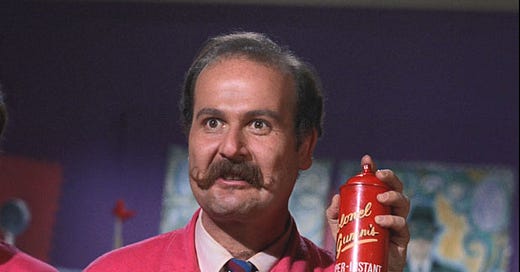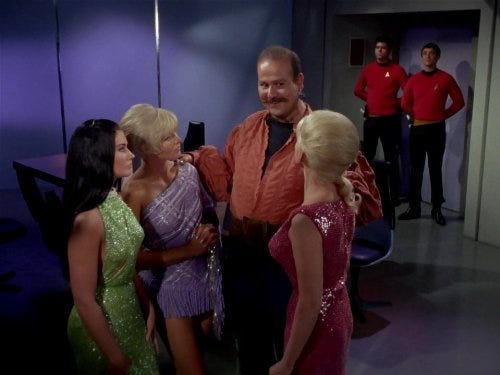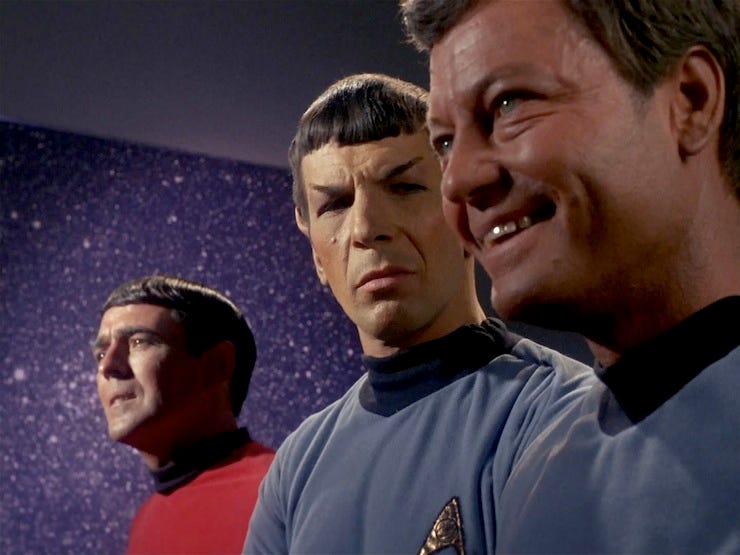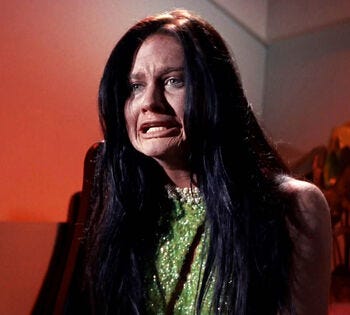“Mudd’s Women” was filmed in time to be the pilot of Star Trek but was never considered a realistic option. It did meet NBC’s demand for a new planet and featured a colorful villain for the main cast to play off. Production declined to submit it though, probably because of the space prostitutes. And this was the “less sexual” version of the show that came only after the failed first pilot.
Even beyond the space prostitutes, which we’ll get to, the episode would have been a poor pilot. It’s paced slowly. The fun planet only shows up at the very end and consists mostly of a drab bunker. The main “mystery” involves figuring out why a bunch of men can’t take their eyes off of beautiful women. Plus, the main cast is completely overshadowed by the hilarious, toothy performance of the guest star villain: Harcourt Mudd, played by Roger C. Carmel.
Carmel was mostly a stage actor before transitioning into television with a starring role on the NBC sitcom The Mothers-in-Law, which was created by Desi Arnaz, ex-husband of Star Trek production studio Desilu’s owner Lucille Ball (and half of its namesake). He then landed guest appearances on The Dick Van Dyke Show and Batman before being brought on board as Harcourt Mudd.
Roger Carmel as “Colonel Gumm” on Batman, sporting the same mustache he appears to have retained for his entire career.
Mudd appears on the Enterprise under the assumed name of “Leo Walsh”, being brought aboard after his ship is destroyed by an asteroid in a high-speed chase with the heroes. He also brings aboard his crew: three seductive, garishly costumed women who he claims to be transporting to a newly established colony to serve as wives for the settlers. The men aboard the Enterprise find them hypnotic.
Everything about Mudd, and the episode as a whole, screams classic Western show. Mudd is costumed somewhere in between cowboy and pirate, with a flowy top, high boots, a magnetic mustache, and spritely colors. His job echoes the “mail-order bride” phenomenon in the Old West, whereby women would correspond with settlers via personal ads and then be transported from their homes to their new husbands.1 Mudd also has a sort of scoundrel quality and rapport with Kirk that feels very “sheriff/conman”; by the end of the episode you even get the sense they half like each other. Given that Star Trek was consciously modelled after Western shows like Wagon Train, which were big business in the 60s, the similarities are not too surprising.
Mudd himself is surprising though. He’s charming and gregarious but also arrogant and controlling. It’s not five minutes after he sets foot on the Enterprise that he’s scheming to become captain and his schemes drive the episode forward. Our main cast is fully reactive to this radioactive mess of a human.
Harry Mudd and his women, played by Karen Steele, Maggie Thrett, and Susan Denberg.
Kirk immediately declares that Mudd is to be tried for his crimes, namely failing to stop at the command of a starship. Given that the chase damaged the Enterprise’s lithium crystal system, which keeps the ship moving, Kirk seems to have a bit of a personal grudge against the strange and annoying pimp he’s been forced to rescue. Kirk subjects Mudd to a lie detector test during his hearing, with Mudd displaying a hilarious frustration as his charm proves futile against the ship’s computer (voiced by Majel Barrett, also Nurse Chapel). It’s here that the crew learns “Leo Walsh” is Harcourt Mudd, that he has a long criminal history, and that he was flying his ship completely unlicensed. Essentially every aspect of the man exists in violation. Thus, he’s sentenced, and Kirk plans to turn him in right after the Enterprise fixes its crystal problem and get moving at warp speed again.
Fixing this requires limping to Rigel XII, a lithium crystal mining colony. In the meantime, Mudd plots with his three charges to take over the Enterprise. He sends each of them to seduce a different crew member, but all fail. It gets worse: Eve (Karen Steele), finds that she actually likes the charming, comforting Captain Kirk, and starts to grow sick of Mudd’s controlling nature. This control is literalized through the convenient “Venus Drug,” which transforms the women into more traditionally beautiful versions of themselves and gives them their hypnotic effect. As he tells the women, this “strange effect” is the only way they’ll ever find husbands.
After the failed seductions, Mudd reorients his plan away from the crew of the Enterprise to the miners on Rigel XII. He manages to obtain a communicator and page the work camp, promising them the women in exchange for their demanding his release as payment for the crystals. Forced with the possible failure of the Enterprise, Kirk acquiesces and allows Mudd and the women to beam down to the colony. However, the miners, led by a man named Childress, betray them and use the crystals as a bargaining chip. Rather than pay, they take the women and host a dance with sinister overtones, angering both Kirk and Mudd. Eve once again proves the problem though. She is hurt when the miners desire the other two over her and runs off into the cold, dusty storm enveloping the planet. Kirk returns to the Enterprise to find her from orbit.
The crew react to the women for the first time. Spock, though, reacts to the crew.
In the meantime, Childress pursues and finds Eve. The two hunker down in a sparse bunker to play house while the storm rages outside. Childress begins to warm to Eve after she makes his first decent meal in years, but is shocked when they wake the next morning. The Venus Drug has begun to fade and he finds her significantly less enchanting. Thankfully, Kirk and Mudd locate the two by scanning the planet and arrive just in time for Eve to snatch another dose of the drug and shift back into a more striking form. Childress at first feels cheated, but Kirk and Mudd reveal that the dose she took was no drug at all. Eve’s beauty is all placebo. As Kirk and Mudd note:
Kirk: There’s only one kind of woman.
Mudd: Or man, for that matter.
Kirk: You either believe in yourself, or you don’t.
Childress gives into the original deal and offers up the crystals. Kirk offers to take Eve away but she elects to stay. It seems to her that there’s no future with Kirk. After all, he’s “got someone up there called the Enterprise” already. As they leave, Kirk and Mudd, perhaps now bonded through their earlier mutual failure, banter about Mudd’s upcoming trial.
Mudd: Don’t you think that you could possibly, by accident, arrange to leave me behind here? On this planet that would be punishment enough.
Kirk: I can’t do that, Harry, but I will appear as a character witness at your trial. If you think that’ll help.
Mudd: They’ll throw away the key.
“Mudd’s Women” coasts through this basic plot powered by the charisma of Carmel’s performance. He’s effusively written, filling up space with flowery language and never thinking a five-word thought he couldn’t speak in ten. He pairs this verbosity with almost constant movement. His arms, eyes, and hands all move to accentuate what he says, all in service of the con. It lends Mudd an air of constant distraction; you can’t pin him down and he will easily shrug you off. Throughout the episode, only a computer is able to fully expose his lies. Carmel pitches a perfect game. He’s the reason you’re watching here.
Thematically, there’s again a very overtly gendered story going on, with mixed results. Kirk has a speech near the end describing what a good wife is, which takes aim at a sort of superficial sexism. Kirk thinks the miners’ single-minded desire for a beautiful wife is insulting. “You don’t want wives,” he says, “Not someone to help you, not a wife to cook and sow and cry and need, but this kind. Selfish, vain, useless.” The “Venus Drug” as an idea is meant to condemn the emphasis on a woman’s beauty above all else. Mudd himself is the sort of man that women, as the episode would have it, seek to please by focusing on their appearance.
Ruth (Maggie Thrett) goes through withdrawals of the Venus Drug. The makeup has to be dramatic enough to be noticeable but subtle enough to be written off as the effect of an attitude. I think it mostly walks that line.
To the episode’s credit, Mudd is an explicitly manipulative figure. He’s wrapped these women up in his economic gambit by promising them better lives with husbands and sells them on the idea only by denigrating them. He claims that the drug he provides is the only way they could ever get a man to like them. It certainly seems admirable to lay the blame for this attitude at the feet of men like Mudd rather than the women themselves, but the episode relies on a sort of “gentler sex” essentialism and stereotypical examples of a “good wife” for its counter-argument. It never posits that perhaps these women just wouldn’t need a husband if this is what it would take. We’re still clearly operating within mid-20th century gender roles despite a Stardate of 1329.8.
It fairs better when viewed broadly. Early on, as Spock inspects one of the Enterprise’s damaged lithium crystals, he notes that “Even burned and cracked . . . they’re beautiful.” They power the ship, they contain immense will. It’s a sort of Rosetta Stone for the end, where Kirk and Mudd slip Eve a placebo rather than the real Venus Drug. She lights up. She’s back to beautiful. Not because of some drug but instead because she believes herself to be so. What’s beautiful is not necessarily what’s on the outside but the power and will carried within, the usefulness and confidence a person can provide. To Kirk, this usefulness is what makes a person a person. To Kirk, there’s only one kind of person.
That’s a fine attitude to have as a starship captain. It’s a bit pat for us here. But you hardly notice. Harcourt Mudd is a particularly engaging distraction.
Stray Thoughts
The score in this episode is the best of all the episodes so far. It’s jazzy and a bit seductive when the women are demolishing the brains of ever Enterprise ensign they pass by. Makes for a fun mood throughout.
I did think it was funny that the episode placed such an emphasis on the “strange effect” these women have on men. They’re just conventionally hot! It’s not that strange!
As I noted in my piece on “The Naked Time,” the writers have a clear understanding of Kirk being in love with the ship. He is deeply devoted to his duty. As Mudd warns Eve, “ship captains are already married.” Kirk will always put the Enterprises needs before his own, or anyone else’s.
I read this particularly insightful Twitter thread earlier this week that I wanted to share. While I can’t speak to the author’s comments on the new Trek shows, I think it’s smart to notice how many episodes involve some sort of engineering problem on the Enterprise as the primary plot mover. Those sort of practical considerations help ground you in the world (space travel is hard!) but also establish the characters as competent people who can do their job.
Photo Credits
Colonel Gumm: https://batmanprojekt.com/2019/04/06/batman-66-green-hornet-crossover/
Mudd and the women: https://www.imdb.com/title/tt0708439/
Spock and the crew: https://www.reddit.com/r/startrek/comments/sg4dcy/watching_tos_for_the_first_time_s1_mudds_women/
Ruth during withdrawals: https://memory-alpha.fandom.com/wiki/Ruth_Bonaventure
Go West, Young Woman! | National Postal Museum (si.edu), https://postalmuseum.si.edu/research-articles/go-west-young-woman








i had so many thoughts on this one
- spock is so gay. kirk is so bi. bones is so divorced. i love that trio so much
- i was really interested in the little sneak peak on the future criminal justice system. apparently smuggling warranted a sentence of psychological treatment (effectiveness disputed! hey, just like modern day.) also, what is kirk's authority to seize and question someone? is this a military thing or is he a de facto law enforcement officer in space? or was he just doing that because he felt like it?
- you called it a lie detector test, but i don't think it was quite that. the machine didn't work like a polygraph by reading his bodily responses to determine whether he was lying - it just compared his answers to its records. (note that it didn't say whether the women were lying, just that it had no information on him.) the interaction wasn't a way to tell if mudd was lying, but an opportunity for him to tell the truth, which is a distinction i find interesting
- yeah yeah real beauty is within but a change in your attitude can give you an instant full face of makeup? um sure. well i'll be taking that "placebo" just in case
- i am very lucky no one is checking my vitals when i'm in a room full of beautiful women becauseeeeee